Corporate Adult TCKs & Mental Health
Tanya Crossman
This series of articles provides data on specific sectors, drawn from our 2024 Survey: Impact of Childhood Global Mobility on Adult Wellness. The research connects the dots between both hardships and resilience factors in childhood with physical and emotional wellness markers in adulthood. Learn more about all our research surveys and white papers here.
We prioritize research so that...
We prioritize research so that...
- Caregivers better understand the needs of the TCKs they care for and therefore build effective programs and support systems.
- Adult TCKs feel seen in their stories, knowing they are not alone and there is hope for thriving.
Corporate Adult TCKs & Mental Health:
First Look at the 2024 Research
Click on these buttons to scroll down the page to specific sections.
Conducting research is an important part of how TCK Training cares for globally mobile families. In 2024, we ran a survey of 1,643 Adult TCKs, including 98 people who lived abroad during childhood due to a parent's corporate assignment. This research reflected the complexity of an international upbringing, with both wonderful experiences and difficult impacts represented in the data:
96% of corporate TCKs saw a "broad worldview" as one of their strengths 91% of corporate TCKs said living internationally as a child was a good experience overall 88% of corporate TCKs experienced symptoms of at least one mental health concern 46% of corporate TCKs had been diagnosed with anxiety 33% of corporate TCKs had a "serious mental health crisis" during childhood
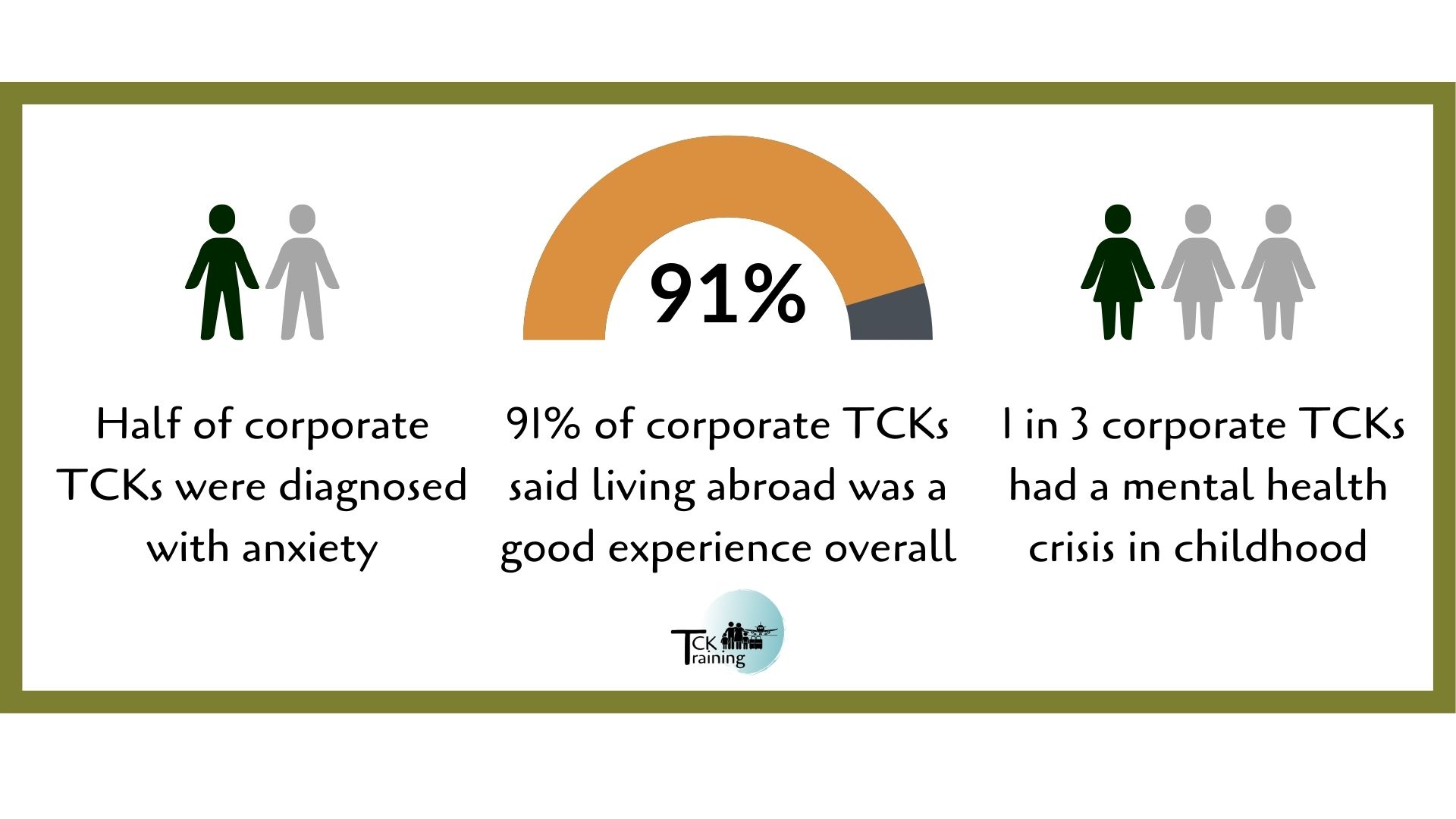
29% (nearly 1 in 3) of those who grew up in international business families were at high risk of adverse outcomes in adulthood. [...] When asking a family to move abroad, we are asking them to risk their children’s long-term wellness. That said, risk does not equal certainty, and there is a lot we can do to buffer children from these risks.
Views of Childhood
Respondents were offered a list of statements and asked which reflected their own experiences of growing up as TCKs. These statements were based on common sentiments expressed during our work with hundreds of TCKs, including those we support with Unstacking Sessions. There were a lot of positive sentiments expressed, including:
22% of corporate TCKs said their experience was “mostly painful” which was similar to what we saw in other sectors. It is important to note that the majority of corporate TCKs said they could see both good and hard parts in their story, and that living overseas was a good experience overall.
- 96% of corporate TCKs could see both good and hard parts in their story.
- 91% of corporate TCKs said living internationally as a child was a good experience overall.
- 68% of corporate TCKs said this was “the best way to grow up”.
- 60% of corporate TCKs said living abroad made their family closer.
22% of corporate TCKs said their experience was “mostly painful” which was similar to what we saw in other sectors. It is important to note that the majority of corporate TCKs said they could see both good and hard parts in their story, and that living overseas was a good experience overall.
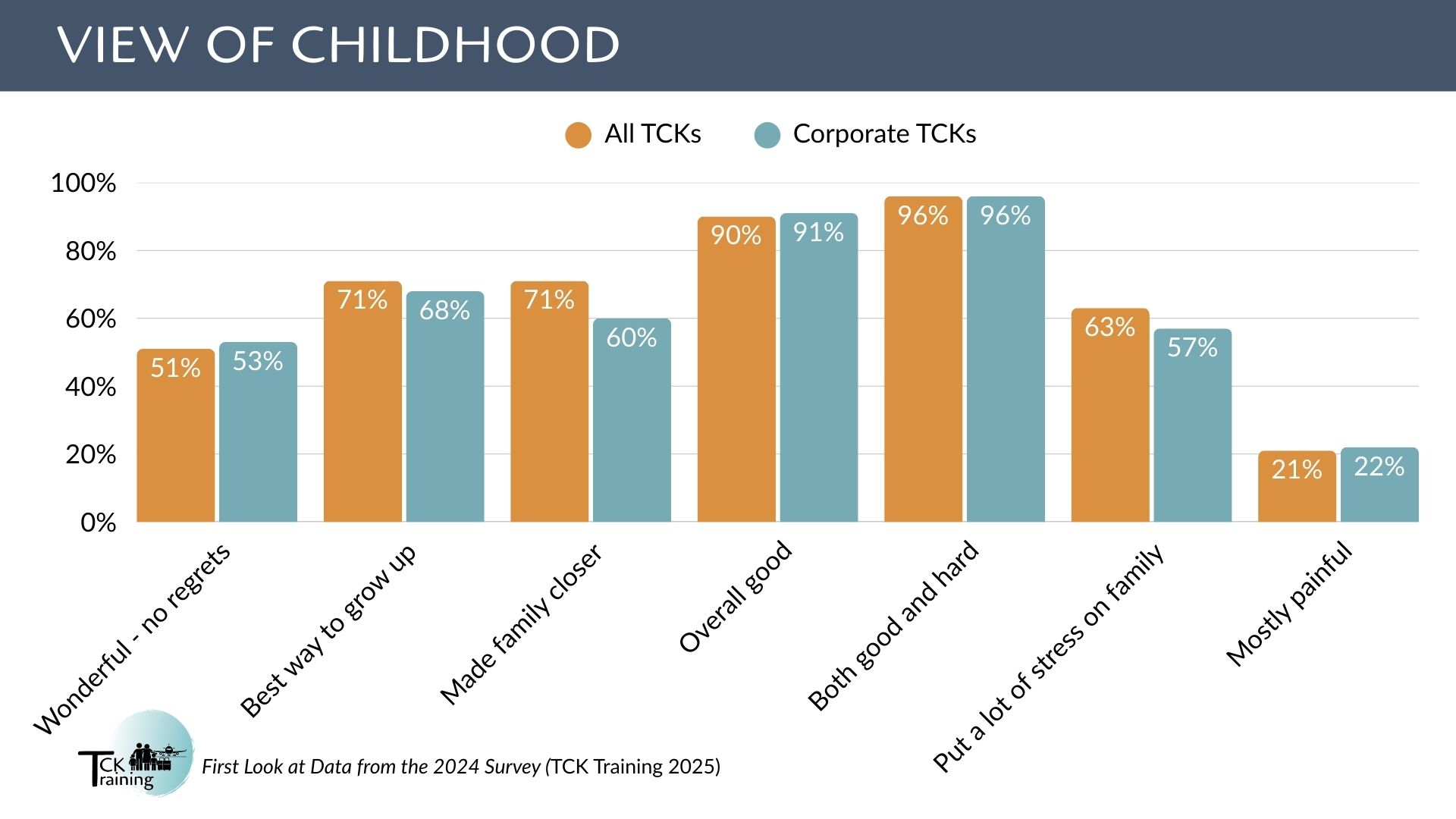
We also reviewed how parents’ occupation impacted TCKs by asking which statements they identified with as children. Corporate TCKs were far less identified with their parents' work than other TCKs (such as the children of diplomats, military personnel, and missionaries). Nearly half of corporate TCKs (47%) said they were "indifferent" to their parents work abroad - that it was no different to working elsewhere - and only 16% identified with their parent’s work/purpose – considerably lower than seen in other sectors. 42% of corporate TCKs were proud of their parent’s work and 36% said that as children they wished to follow in their parent's career footsteps - again lower than seen in other sectors.
There seemed to be benefits to this 'disconnect' from parents' occupation. Corporate TCKs were less likely to feel pressure to "perform" while visiting their passport country (30%) and half as likely to feel pressure to be "perfect" while living abroad (26% vs 58% of all TCKs). Corporate TCKs were nearly twice as likely to feel pressure to maintain their home language/accent (31% vs 17%), though this may be impacted by a higher percentage of Asian TCKs in this sector.
There seemed to be benefits to this 'disconnect' from parents' occupation. Corporate TCKs were less likely to feel pressure to "perform" while visiting their passport country (30%) and half as likely to feel pressure to be "perfect" while living abroad (26% vs 58% of all TCKs). Corporate TCKs were nearly twice as likely to feel pressure to maintain their home language/accent (31% vs 17%), though this may be impacted by a higher percentage of Asian TCKs in this sector.
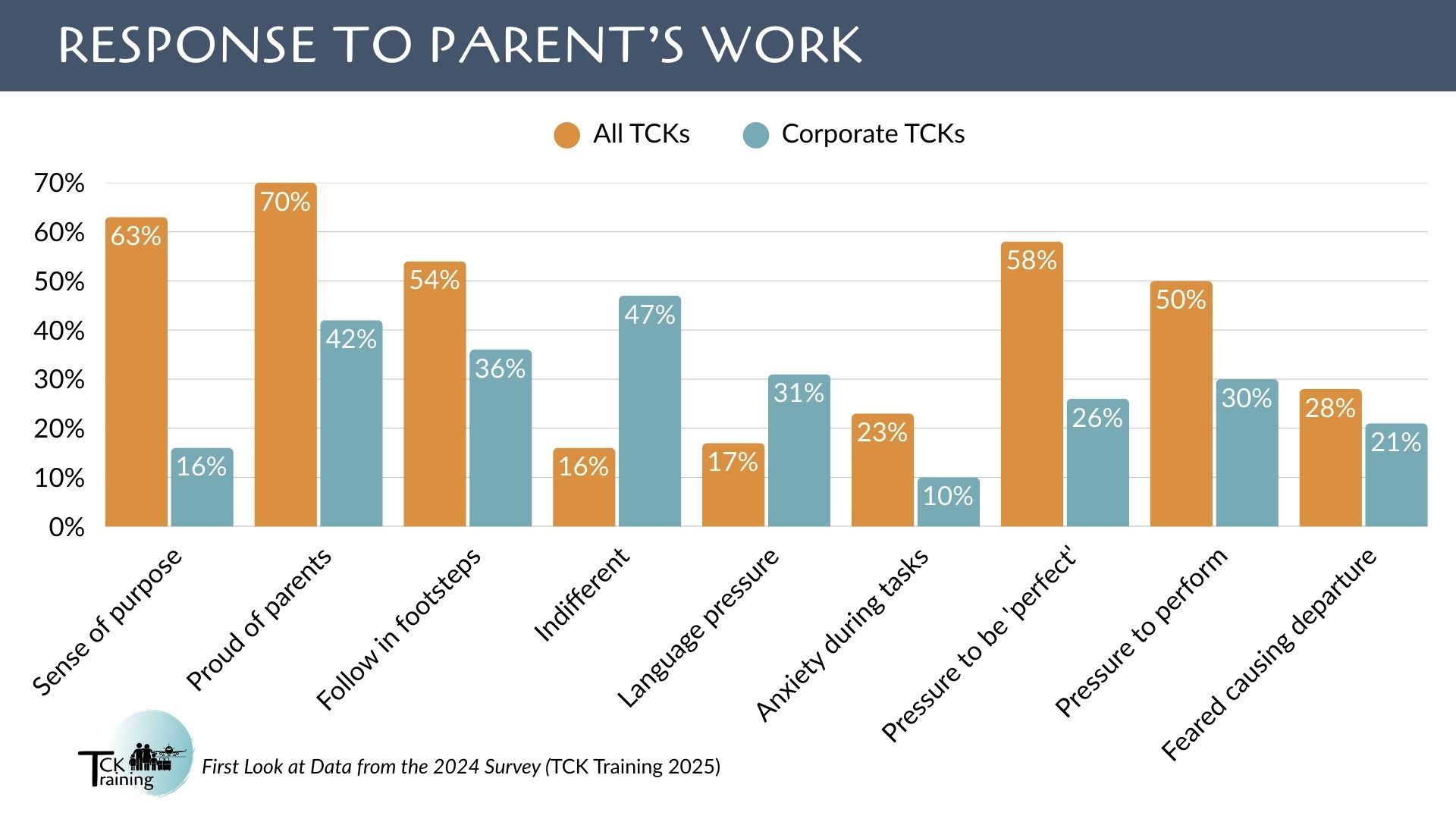
Strengths and Struggles in Adulthood
Drawing from our experiences working with hundreds of TCKs, we also curated lists of potential strengths and struggles that might be identified during adulthood. These were predominantly taken from things we regularly hear TCKs say when describing their experiences, but also included words and phrases that are often used to describe the TCKs life – for better or worse.
Strengths
There were many areas in which corporate TCKs saw strengths in their adult selves, such as the 96% who saw a Broad Worldview as one of their strengths. Corporate TCKs were more confident of certain strengths that other TCKs, including:
In addition, 81% of corporate TCKs saw Adaptability as one of their strengths and 74% affirmed Resilience (on par with other TCKs).
- 93% of corporate TCKs identified Empathy as a strength
- 93% of corporate TCKs identified Bridge Between Cultures as a strength
- 70% of corporate TCKs identified Hope in Adversity as a strength
- 59% of corporate TCKs identified Language Learning as a strength
In addition, 81% of corporate TCKs saw Adaptability as one of their strengths and 74% affirmed Resilience (on par with other TCKs).
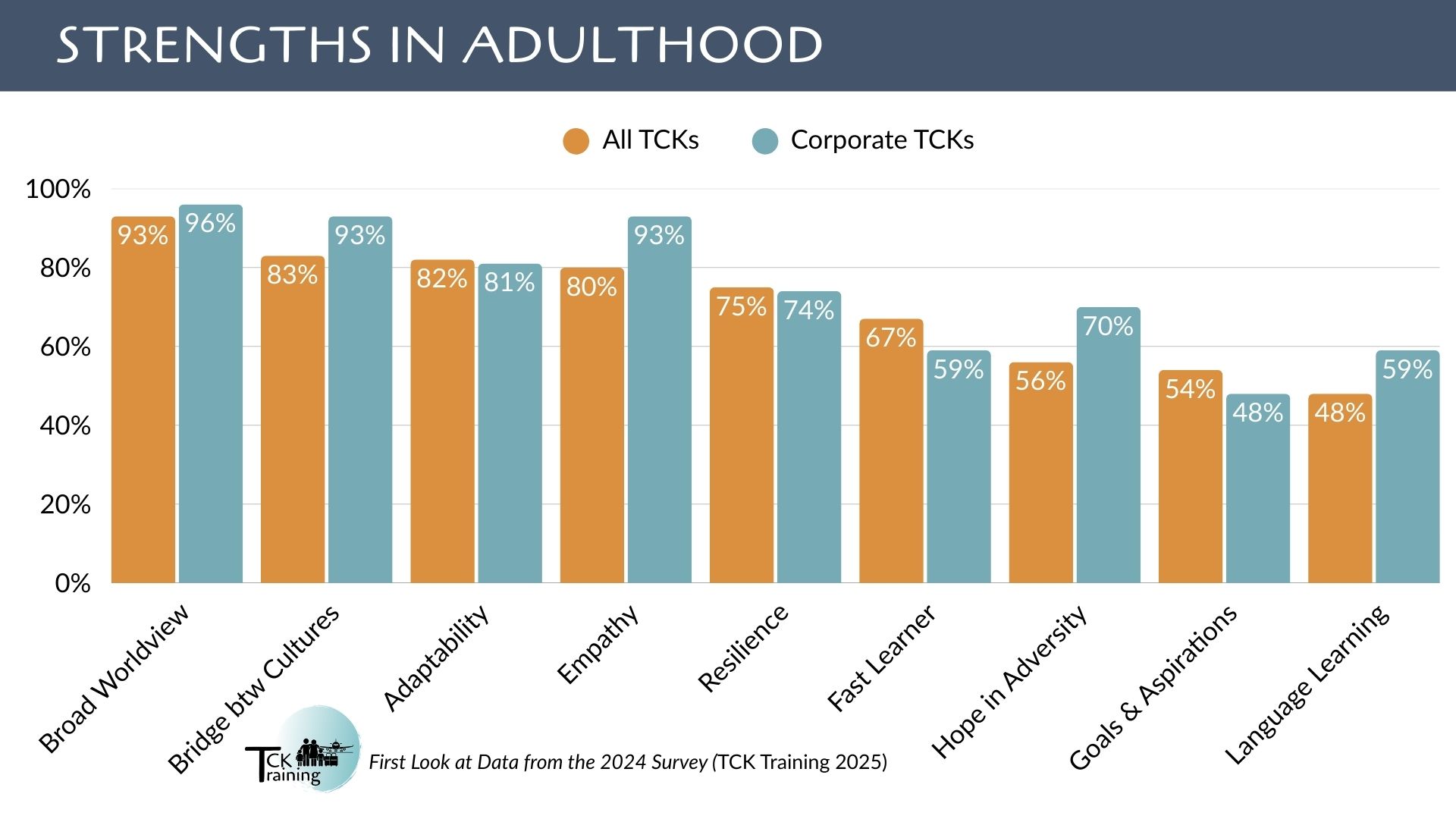
Struggles
Generally speaking, corporate TCKs identified these areas of struggle in adulthood at similar rates to other TCKs, though corporate TCKs were more likely to say they struggled with itchy feet, emotional dysregulation, and fear of commitment than other TCKs.
Corporate TCKs' greatest areas of struggle included:
- 72% of corporate TCKs had trouble belonging
- 65% of corporate TCKs experienced identity uncertainty
- 65% of corporate TCKs experienced "itchy feet"
- 53% of corporate TCKs had difficulty naming their own feelings
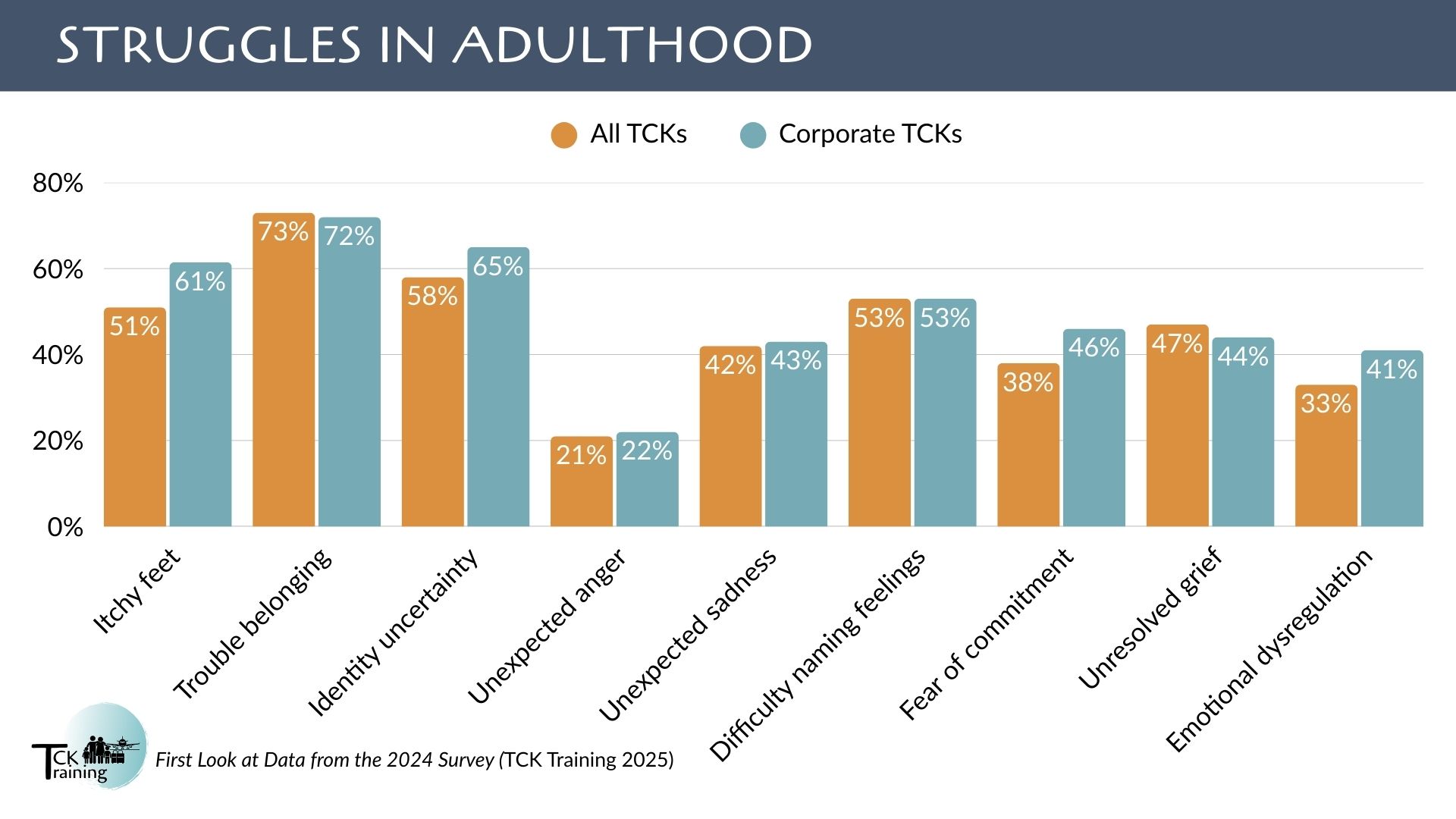
Mental Health
A range of questions were asked regarding experiences of mental health. This included discussions of childhood and adulthood experiences, what mental health care was available (and which was most helpful), screening questions developed in conjunction with several mental health professionals, and questions regarding formal medical diagnoses. We will begin here by looking at key symptoms of mental ill health reported by corporate TCKs through screening questions.
Mental Health Concerns in Corporate TCKs
33% of corporate TCKs said they experienced a “serious mental health crisis” during childhood. 88% of corporate TCKs surveyed had experienced symptoms of at least one mental health concern during their lifetime, and nearly half (47%) had at least one formally diagnosed mental health condition. This is similar to what was seen in TCKs from other sectors.
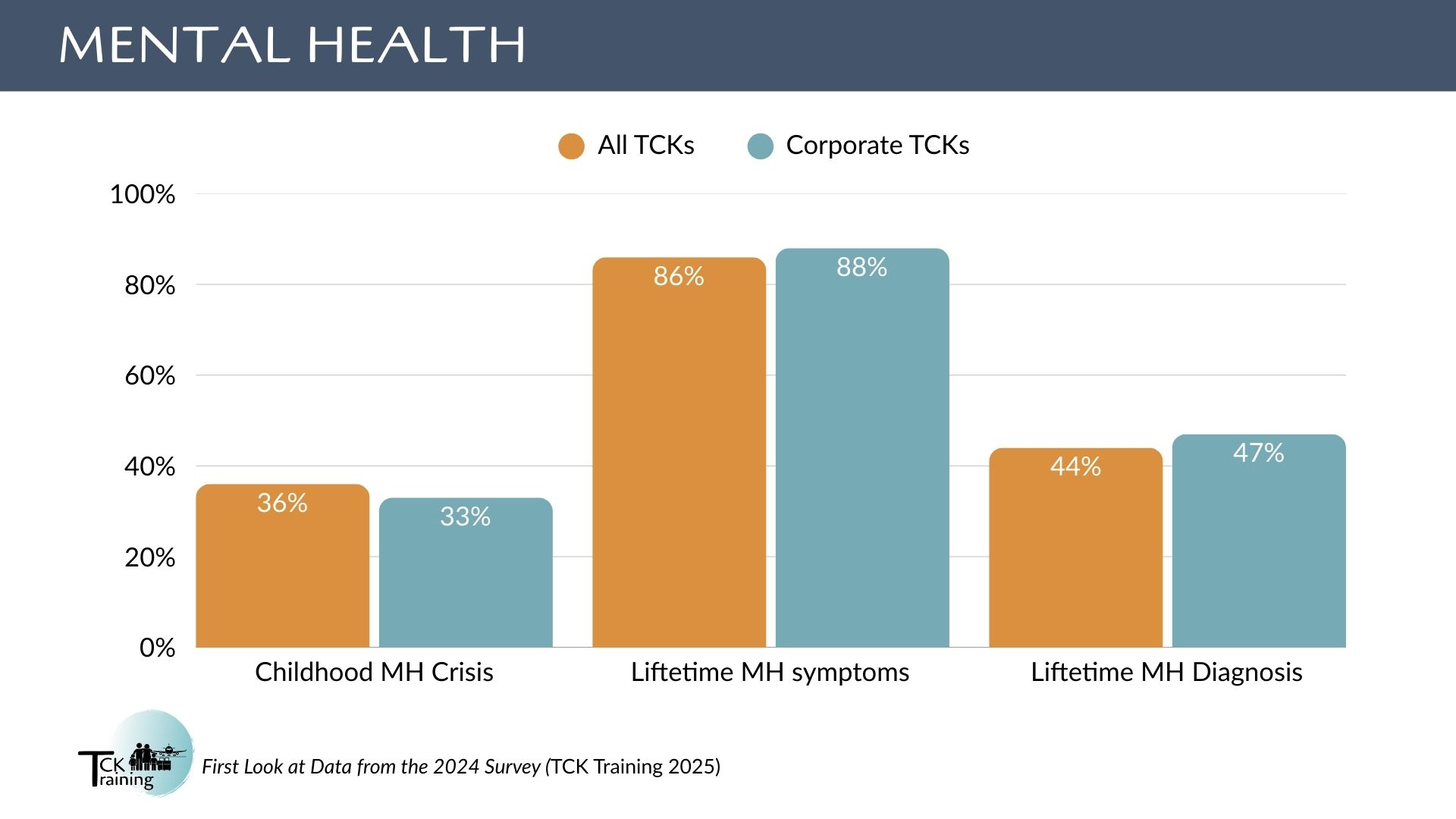
Symptoms of Mental Ill Health
A high percentage of corporate TCKs had experienced symptoms consistent with anxiety (67%), depression (57%), suicidal ideation (51%), and PTSD (44%). While most of this was consistent with the rates seen in other TCKs, corporate TCKs were more likely to experience certain mental health concerns than other TCKs:
- Corporate TCKs were 41% more likely to self harm than other TCKs.
- Corporate TCKs were 27% more likely to experience disordered eating than other TCKs.
- Corporate TCKs were 12% more likely to experience anxiety than other TCKs.
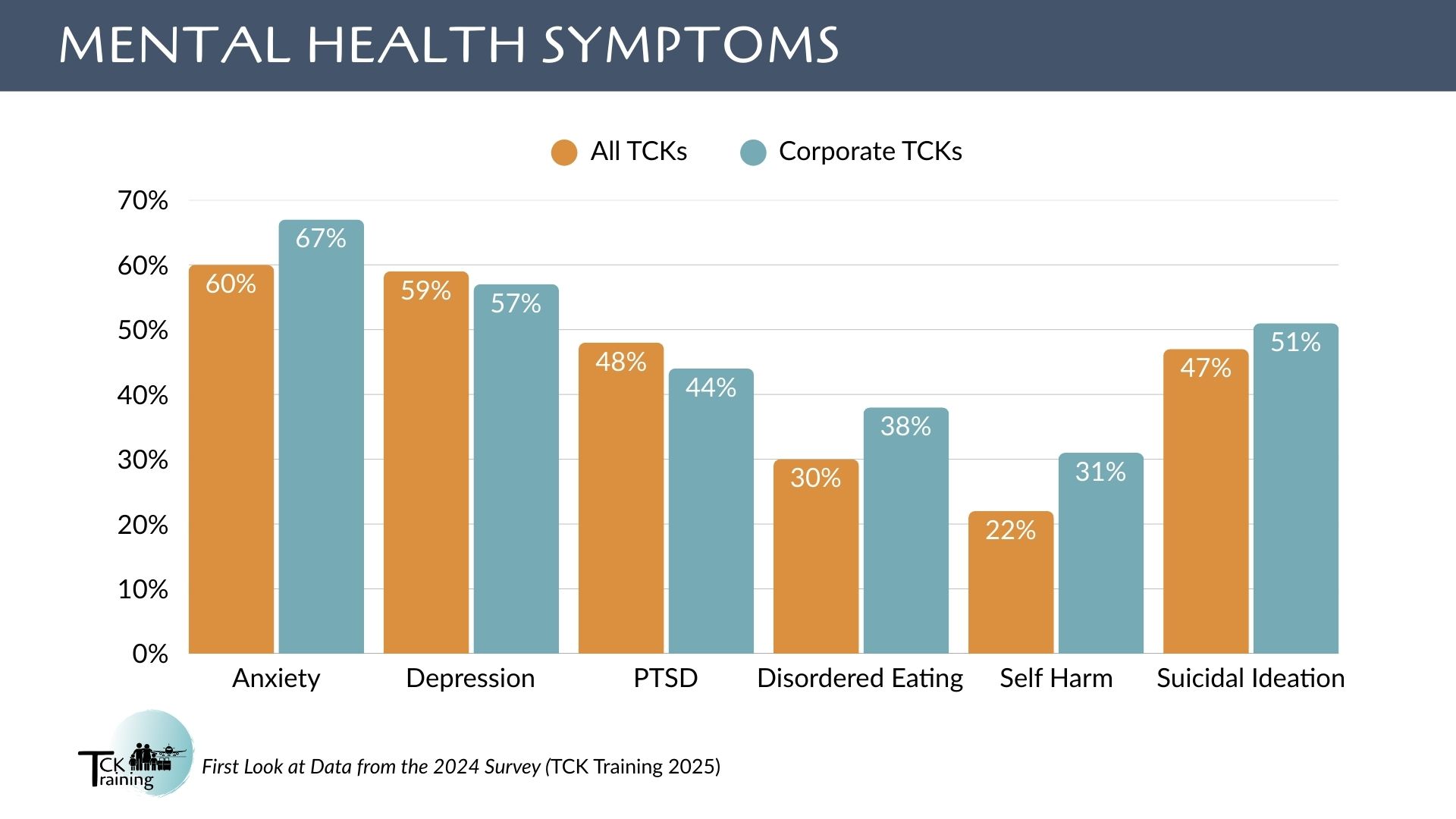
Diagnoses of Mental Health Conditions
Anxiety was the most commonly diagnosed condition among corporate TCKs. 46% of all corporate TCKs were diagnosed with anxiety, nearly a third (31%) with depression, and 16% of corporate TCKs had been diagnosed with panic attacks.
The lower diagnosis rates for other conditions is not necessarily a good thing. 38% of corporate TCKs answered the screening question for disordered eating in the affirmative, saying they had engaged in these practices - but only 16% of these received a diagnosis. 29% of those who affirmed that they had self harmed had been diagnosed. 31% of those who experienced suicidal thoughts were diagnosed.
The lower diagnosis rates for other conditions is not necessarily a good thing. 38% of corporate TCKs answered the screening question for disordered eating in the affirmative, saying they had engaged in these practices - but only 16% of these received a diagnosis. 29% of those who affirmed that they had self harmed had been diagnosed. 31% of those who experienced suicidal thoughts were diagnosed.
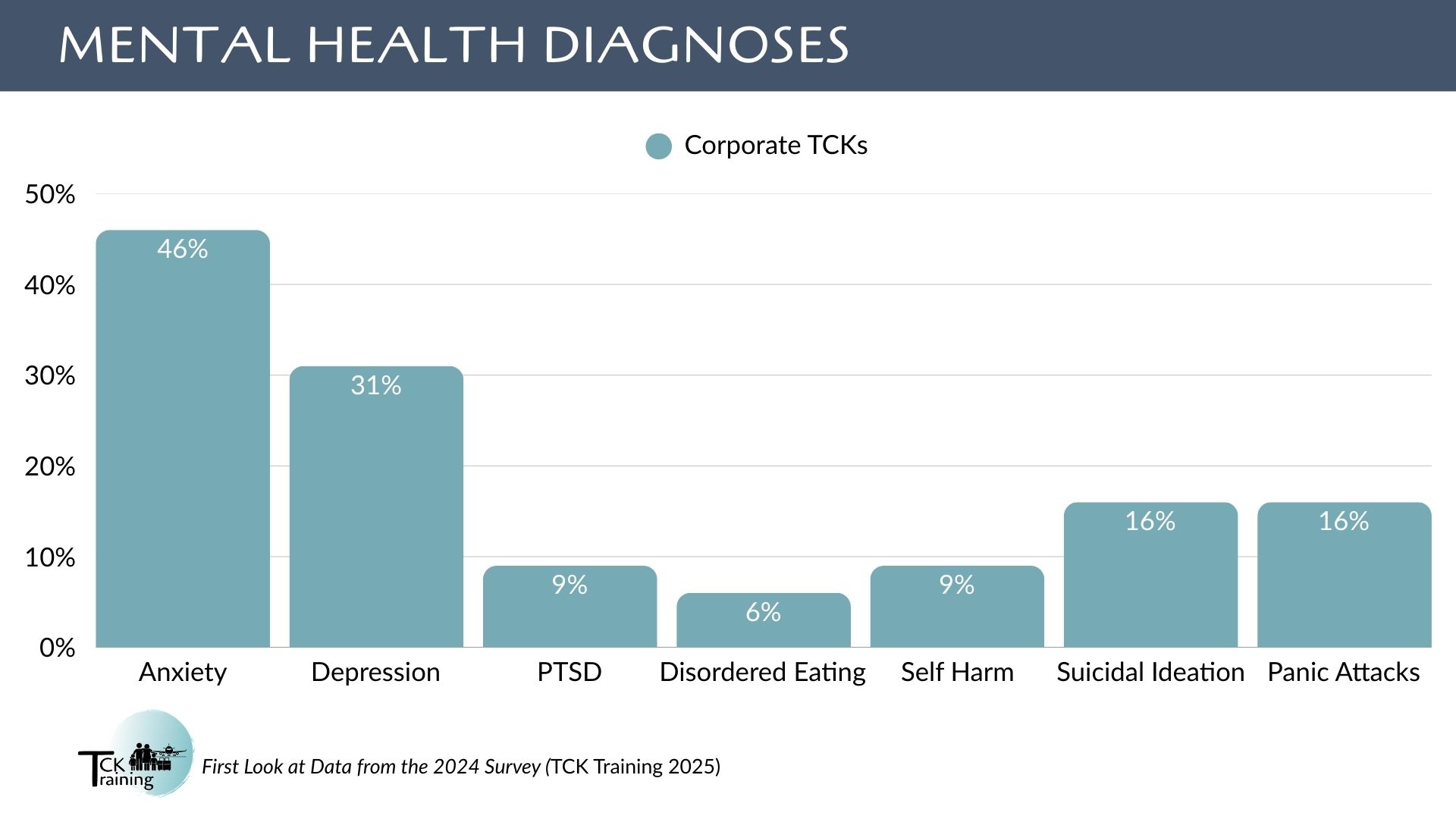
Previous research showed that a significant proportion of corporate TCKs grew up in homes where adults struggled with their own mental health. It is important that corporate families living internationally receive support to improve the mental health of parents and children alike.
IBKs [International Business Kids] reported the highest rate of household adult mental illness of all sectors, both among the older generation (42%) and the younger generation (44%). The high rates of adult mental illness among TCKs in comparison to Americans demonstrates that many expatriate families are under stress, especially those who move abroad for work, and they need support.
Implementing Effective Support
This data reveals a complex picture of corporate TCKs’ globally mobile childhoods: both positive experiences of childhood overall, and difficult experiences with lasting impacts. Taking time to acknowledge this “ampersand life” – the both/and of the corporate TCK experience – is important. As we do this, we ask the question: with this knowledge in hand, what can we do to provide empathetic and effective care to families who travel internationally for work?
The first step is simply acknowledging that the stress of international moves has a deep impact on families and the relationships between parents and children.
The first step is simply acknowledging that the stress of international moves has a deep impact on families and the relationships between parents and children.
International moves are one of the most stressful life events one can experience, and this is especially true for children. Young people experience international moves in a more emotionally intense way than adults... Providing children with robust and high-quality relocation support is important to supporting their mental health in today’s challenging environment, and for organizations, it demonstrates to their employees that they and their family members are valued, respected, and appreciated.
Having acknowledged this difficulty, we can start reaching out for resources that will support corporate families going through the additional stresses of international relocations. TCK Training is committed to providing tools and support systems that empower corporate TCKs and their families to thrive no matter where in the world they are.
Empty space, drag to resize
HR & Relocation Teams
For Parents of Corporate TCKs
For Adult Corporate TCKs
Related Blog Posts
For HR, Relocation Teams & Other Care Providers:
Those working in HR and relocation service to support these families can be trained to understand the specific issues they face beyond logistics and into the future. Additional supports can also be outsourced, and families can be provided with their own library of resources.
Providing adequate preventive care and education of protective factors is a must for all international businesses. Corporate HR should be trained in how to equip families to care for their children before (and while) they go abroad on assignment. Families left on their own without help from the companies sending them on assignment need to know there is information and support available to them.
For Parents of Corporate TCKs
Parents can also build their own library of resources – both a literal library, and accessing online trainings that are designed for those raising children abroad. This workshop on Raising Thriving Kids Abroad is a place to great start!
TCK Training also offers a range of free resources to help families get started with tools to support their children through the stresses of international life.
TCK Training also offers a range of free resources to help families get started with tools to support their children through the stresses of international life.
Families need education to understand not only the rewards but also the risks for international life. When a company sends them abroad, that company also bears responsibility for providing adequate information and effective support.
For Adult Corporate TCKs
Living abroad as a corporate kid comes with unique joys and struggles – and that’s okay! Acknowledging the both/and of this life helps us.
As a corporate TCKs you can receive support directly – no matter how old you are, and how long ago you lived abroad. There are a range of Unstacking resources to help you process your experiences and how they’ve shaped you. There is the Unstacking book, coaching sessions, and a self-guided course. Learn more about these and other resources here!
As a corporate TCKs you can receive support directly – no matter how old you are, and how long ago you lived abroad. There are a range of Unstacking resources to help you process your experiences and how they’ve shaped you. There is the Unstacking book, coaching sessions, and a self-guided course. Learn more about these and other resources here!
When you’re a corporate kid, it influences your childhood in lots of ways – many of which you aren’t even aware of... Our parents/families didn’t know what TCKs were, what repatriation was, and how all these transitions were impacting our bodies, emotions, social lives, and academics.
About the Author
Tanya Crossman grew up in Australia and the US before moving to China at age 21; she has worked with TCKs for 20 years. She is the Director of Research and International Education at TCK Training.



